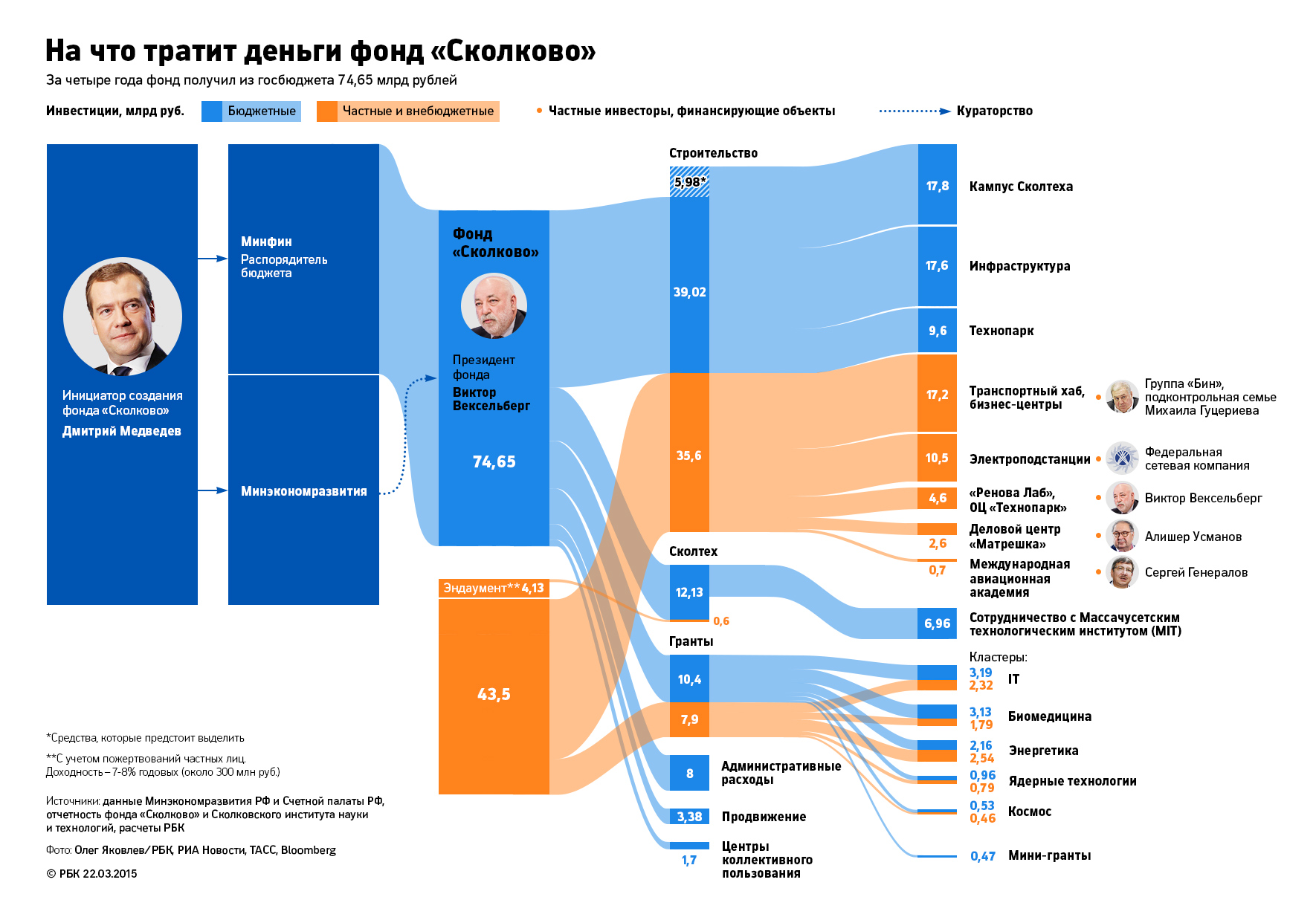RBC journalists find out what happened to Skolkovo
The RBC publication prepared an investigation into what happened to Skolkovo, which was supposed to be Silicon Valley near Moscow, but eventually stopped generating even significant news.
The history of Skolkovo actually “ended” in April 2013, when, after checking the fund by the Accounts Chamber of the Russian Federation, it became clear that in the cluster too high salaries were paid to employees. After that, searches began in the Skolkovo Foundation, quickly raised by the press to the world level, which ended the whole positive image of this initiative of ex-President Dmitry Medvedev.
In 2014, Vladislav Surkov, who fell under US sanctions, left the post of head of the board of trustees of the fund, after which the RF Ministry of Finance demanded that Skolkovo's funding be reduced by 20–40%.
Meanwhile, in the fall of 2010, after Dmitry Medvedev signed the law “On Skolkovo”, the initiative looked quite good.
')
MIT, the legendary Massachusetts University of Technology, which became the foundation's partner, was chosen as an example for creating Skolkovo. About $ 300 million was paid in total for consultations and for “personal needs”, apparently for the right to be called the Skolkovo partner of MIT. The Skoltech resident university was against such payments to the American university, although MIT should have been involved in all Skolkovo processes, including employee training.
For five years (since the signing of the law) 75 billion rubles have been spent on the foundation, most of all on construction. The Skoltech campus was worth 17.8 billion, and another 17.6 billion worth of infrastructure. The foundation hired world-renowned architects (Yoshitaki Tanasyo and Rem Koolhaas), but in the end Hypercube was designed by Russian architect Boris Bernasconi, whose project was personally approved by Dmitry Medvedev. In addition to the Hypercube, only the Technopark community center was built, the remaining projects remained only on paper, including the campus of the resident university.
Not the last role in the history of Skolkovo was played by the “Ponomarev factor” (State Duma deputy), in connection with whose name the conflict about lectures at a fabulous price flared up. Ponomarev argues that it was he who advised Vladislav Surkov to engage in the Skolkovo innopolis when in 2008 problems began at the technology park in Novosibirsk, which he was creating, and were persecuted for political reasons.

The history of Skolkovo actually “ended” in April 2013, when, after checking the fund by the Accounts Chamber of the Russian Federation, it became clear that in the cluster too high salaries were paid to employees. After that, searches began in the Skolkovo Foundation, quickly raised by the press to the world level, which ended the whole positive image of this initiative of ex-President Dmitry Medvedev.
In 2014, Vladislav Surkov, who fell under US sanctions, left the post of head of the board of trustees of the fund, after which the RF Ministry of Finance demanded that Skolkovo's funding be reduced by 20–40%.
Meanwhile, in the fall of 2010, after Dmitry Medvedev signed the law “On Skolkovo”, the initiative looked quite good.
')
MIT, the legendary Massachusetts University of Technology, which became the foundation's partner, was chosen as an example for creating Skolkovo. About $ 300 million was paid in total for consultations and for “personal needs”, apparently for the right to be called the Skolkovo partner of MIT. The Skoltech resident university was against such payments to the American university, although MIT should have been involved in all Skolkovo processes, including employee training.
For five years (since the signing of the law) 75 billion rubles have been spent on the foundation, most of all on construction. The Skoltech campus was worth 17.8 billion, and another 17.6 billion worth of infrastructure. The foundation hired world-renowned architects (Yoshitaki Tanasyo and Rem Koolhaas), but in the end Hypercube was designed by Russian architect Boris Bernasconi, whose project was personally approved by Dmitry Medvedev. In addition to the Hypercube, only the Technopark community center was built, the remaining projects remained only on paper, including the campus of the resident university.
Not the last role in the history of Skolkovo was played by the “Ponomarev factor” (State Duma deputy), in connection with whose name the conflict about lectures at a fabulous price flared up. Ponomarev argues that it was he who advised Vladislav Surkov to engage in the Skolkovo innopolis when in 2008 problems began at the technology park in Novosibirsk, which he was creating, and were persecuted for political reasons.

Source: https://habr.com/ru/post/286928/
All Articles